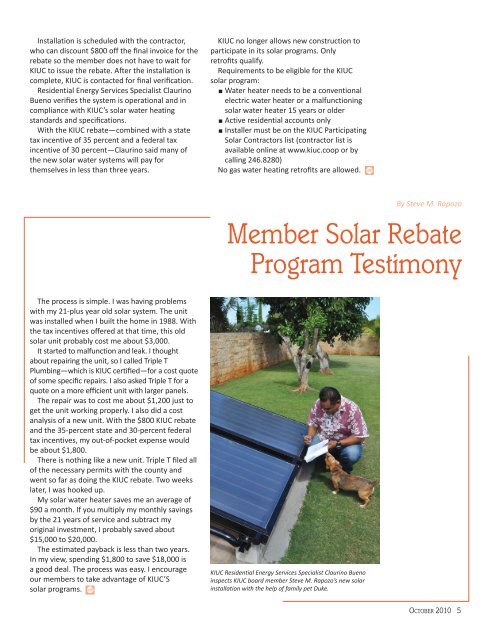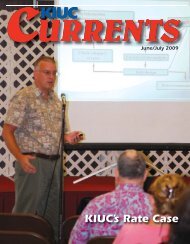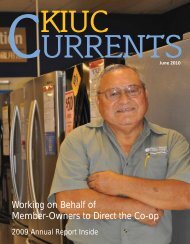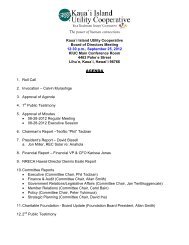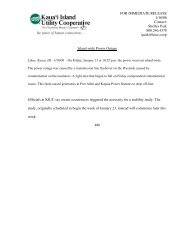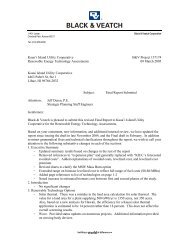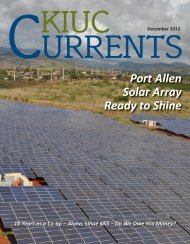Safer is Smarter - Kauai Island Utility Cooperative
Safer is Smarter - Kauai Island Utility Cooperative
Safer is Smarter - Kauai Island Utility Cooperative
You also want an ePaper? Increase the reach of your titles
YUMPU automatically turns print PDFs into web optimized ePapers that Google loves.
Installation <strong>is</strong> scheduled with the contractor,<br />
who can d<strong>is</strong>count $800 off the final invoice for the<br />
rebate so the member does not have to wait for<br />
KIUC to <strong>is</strong>sue the rebate. After the installation <strong>is</strong><br />
complete, KIUC <strong>is</strong> contacted for final verification.<br />
Residential Energy Services Special<strong>is</strong>t Claurino<br />
Bueno verifies the system <strong>is</strong> operational and in<br />
compliance with KIUC’s solar water heating<br />
standards and specifications.<br />
With the KIUC rebate—combined with a state<br />
tax incentive of 35 percent and a federal tax<br />
incentive of 30 percent—Claurino said many of<br />
the new solar water systems will pay for<br />
themselves in less than three years.<br />
The process <strong>is</strong> simple. I was having problems<br />
with my 21plus year old solar system. The unit<br />
was installed when I built the home in 1988. With<br />
the tax incentives offered at that time, th<strong>is</strong> old<br />
solar unit probably cost me about $3,000.<br />
It started to malfunction and leak. I thought<br />
about repairing the unit, so I called Triple T<br />
Plumbing—which <strong>is</strong> KIUC certified—for a cost quote<br />
of some specific repairs. I also asked Triple T for a<br />
quote on a more efficient unit with larger panels.<br />
The repair was to cost me about $1,200 just to<br />
get the unit working properly. I also did a cost<br />
analys<strong>is</strong> of a new unit. With the $800 KIUC rebate<br />
and the 35percent state and 30percent federal<br />
tax incentives, my outofpocket expense would<br />
be about $1,800.<br />
There <strong>is</strong> nothing like a new unit. Triple T filed all<br />
of the necessary permits with the county and<br />
went so far as doing the KIUC rebate. Two weeks<br />
later, I was hooked up.<br />
My solar water heater saves me an average of<br />
$90 a month. If you multiply my monthly savings<br />
by the 21 years of service and subtract my<br />
original investment, I probably saved about<br />
$15,000 to $20,000.<br />
The estimated payback <strong>is</strong> less than two years.<br />
In my view, spending $1,800 to save $18,000 <strong>is</strong><br />
a good deal. The process was easy. I encourage<br />
our members to take advantage of KIUC’S<br />
solar programs.<br />
KIUC no longer allows new construction to<br />
participate in its solar programs. Only<br />
retrofits qualify.<br />
Requirements to be eligible for the KIUC<br />
solar program:<br />
◼ Water heater needs to be a conventional<br />
electric water heater or a malfunctioning<br />
solar water heater 15 years or older<br />
◼ Active residential accounts only<br />
◼ Installer must be on the KIUC Participating<br />
Solar Contractors l<strong>is</strong>t (contractor l<strong>is</strong>t <strong>is</strong><br />
available online at www.kiuc.coop or by<br />
calling 246.8280)<br />
No gas water heating retrofits are allowed.<br />
By Steve M. Rapozo<br />
Member Solar Rebate<br />
Program Testimony<br />
KIUC Residential Energy Services Special<strong>is</strong>t Claurino Bueno<br />
inspects KIUC board member Steve M. Rapozo’s new solar<br />
installation with the help of family pet Duke.<br />
OCTOBER 2010 5


